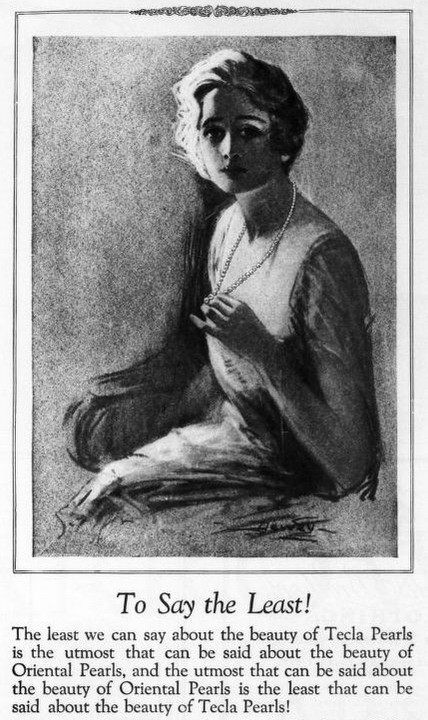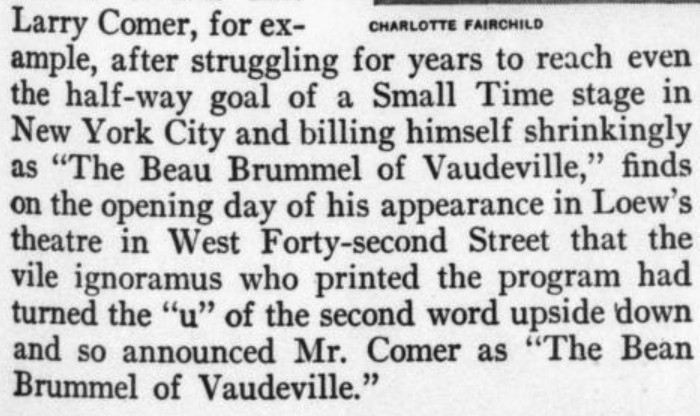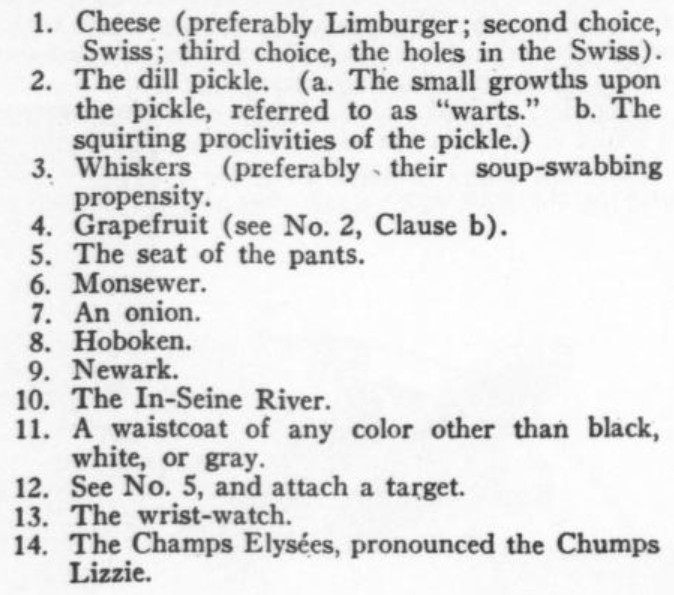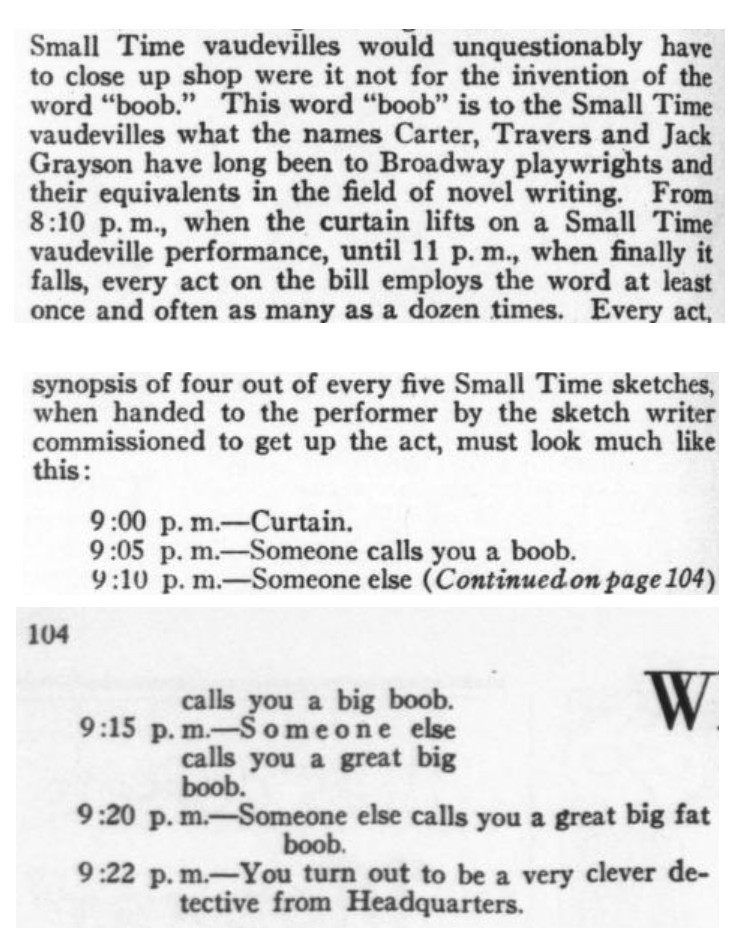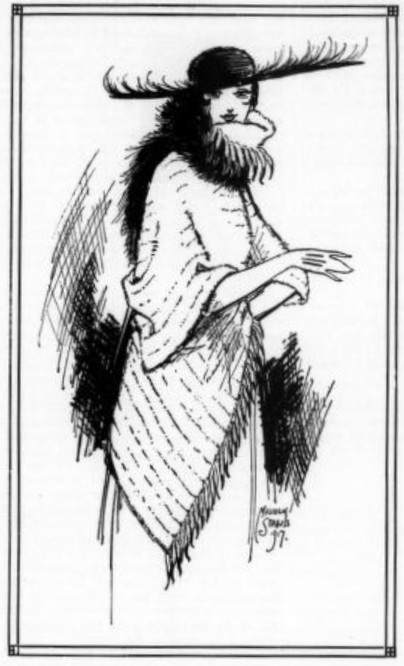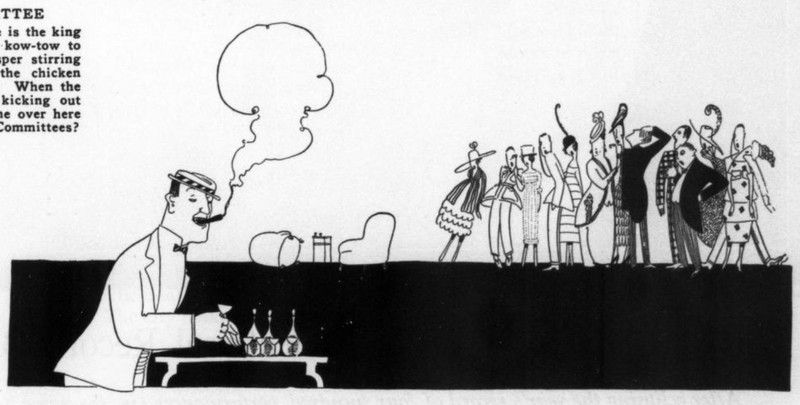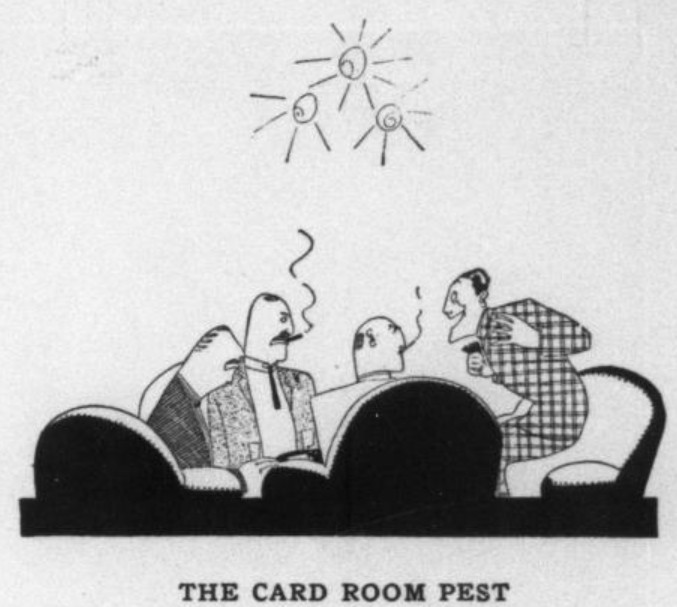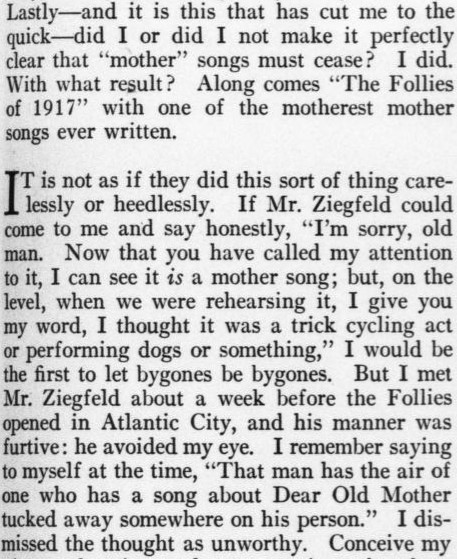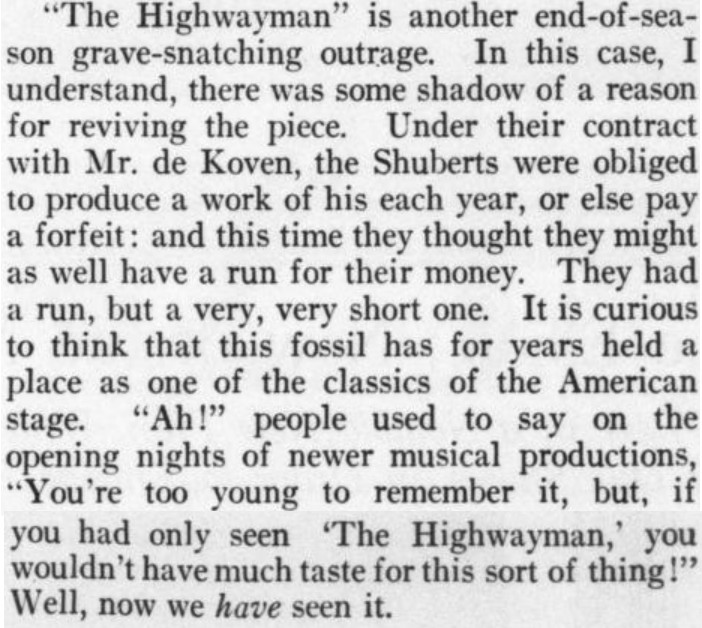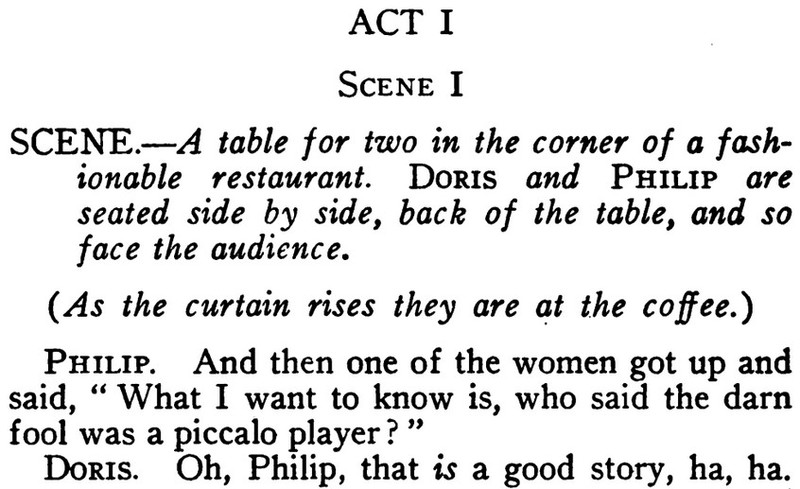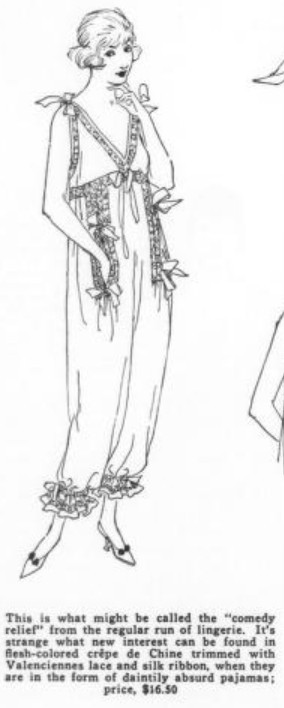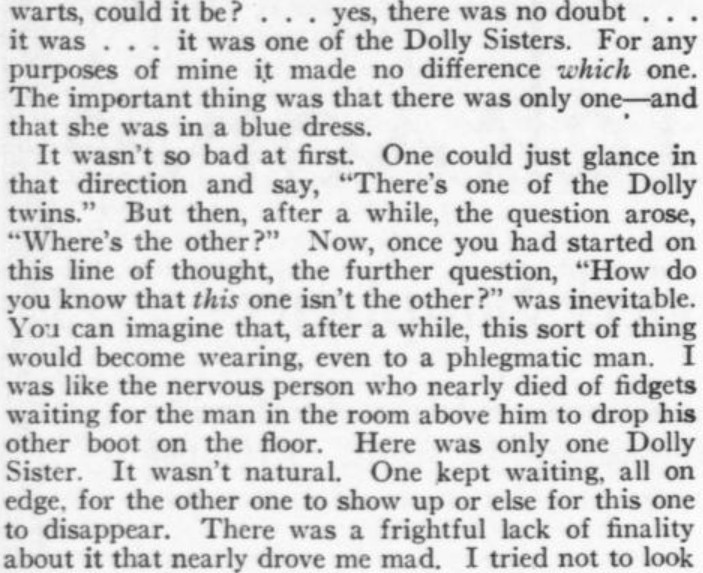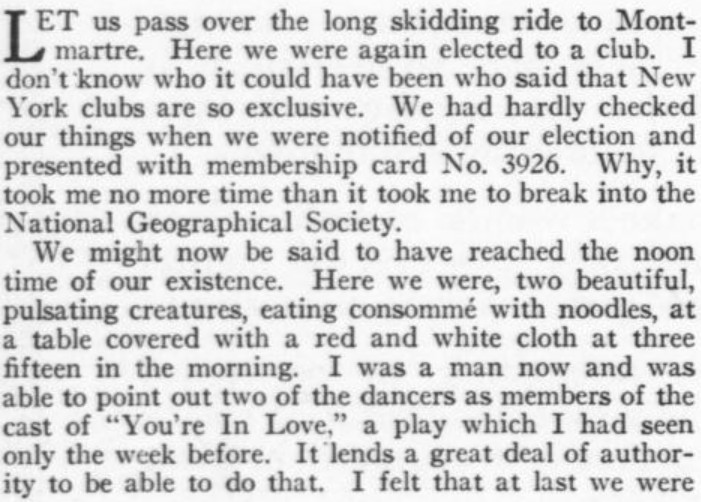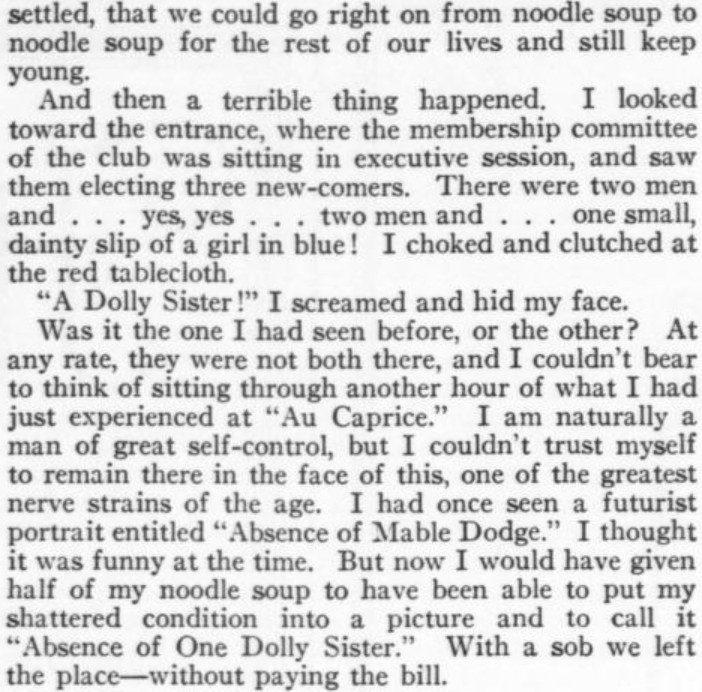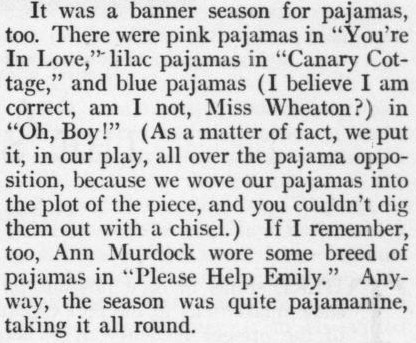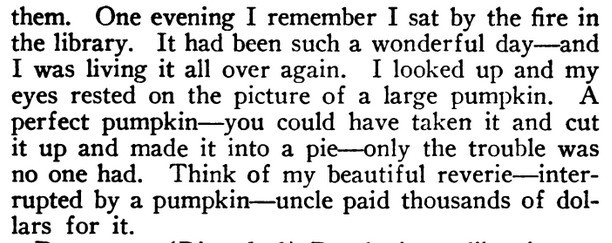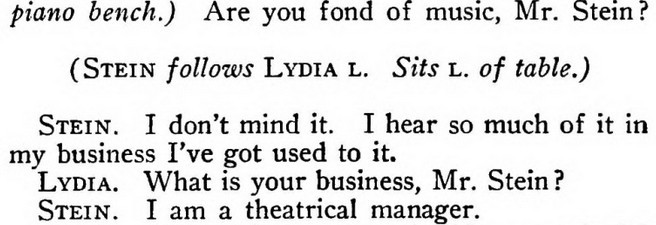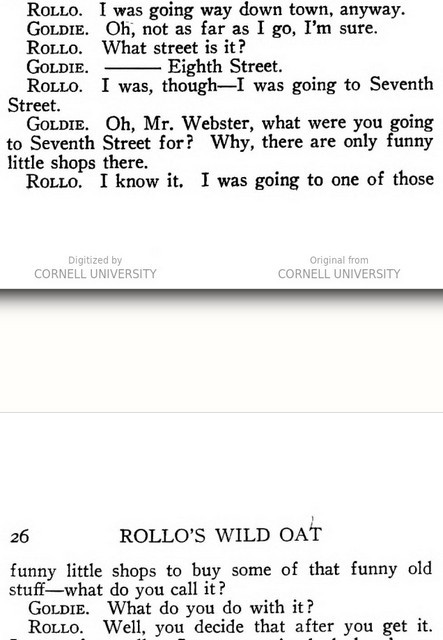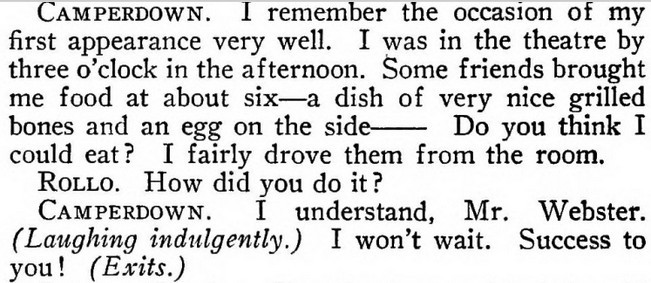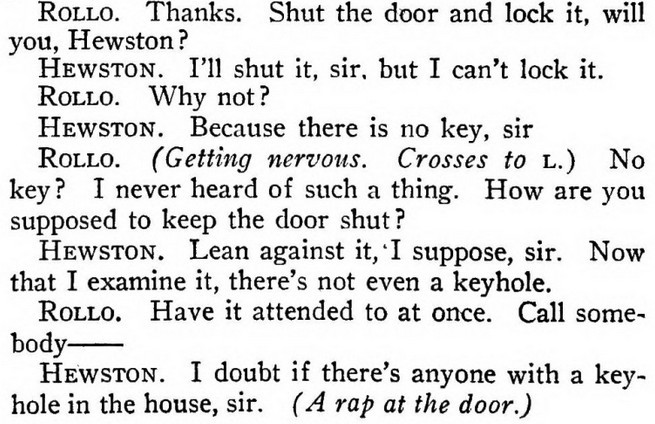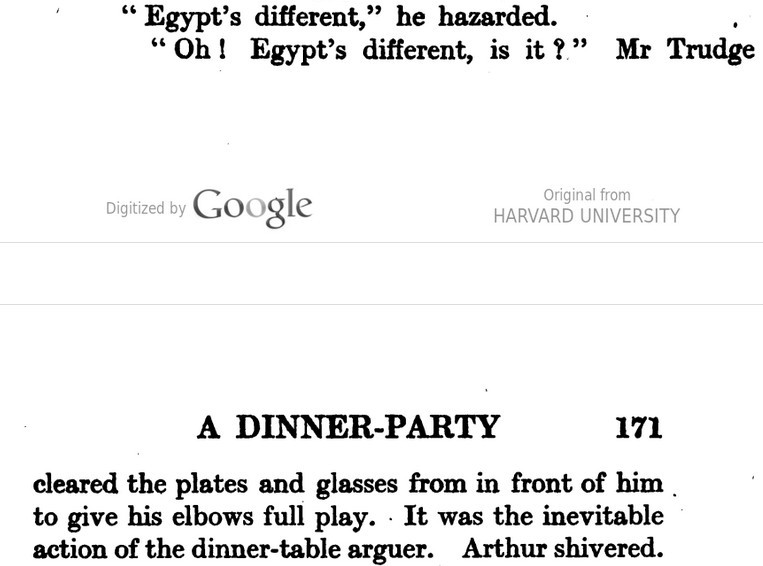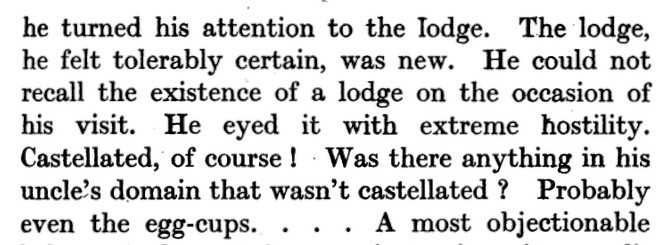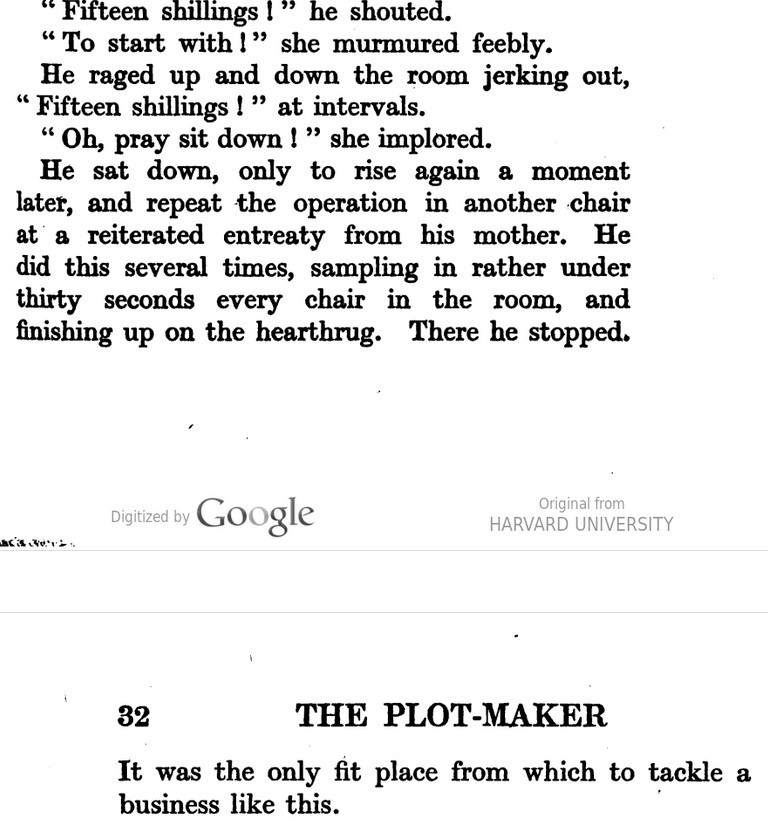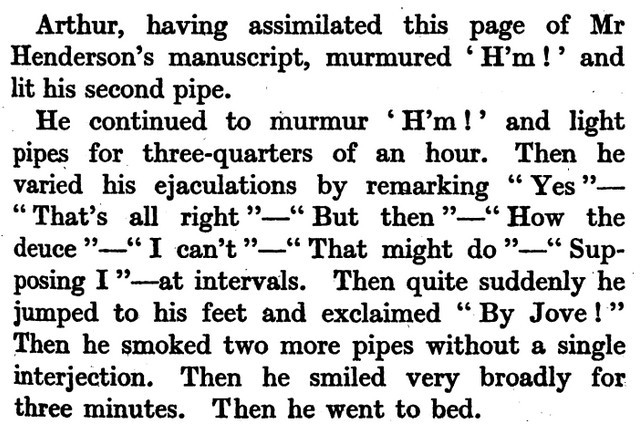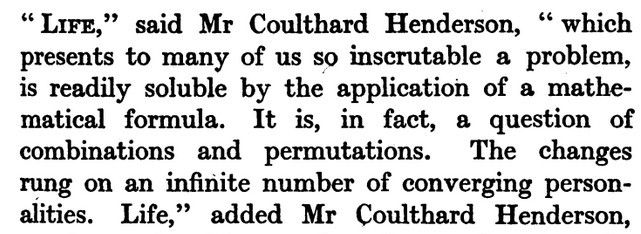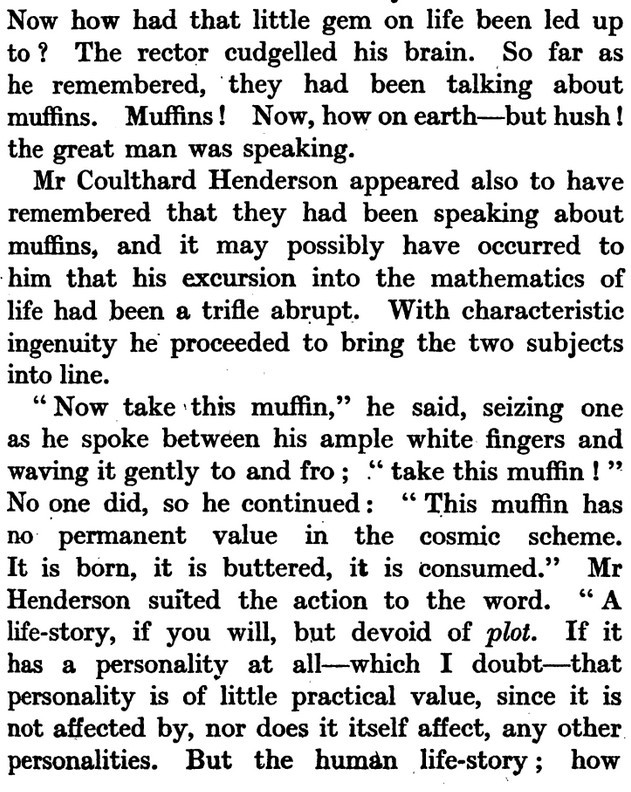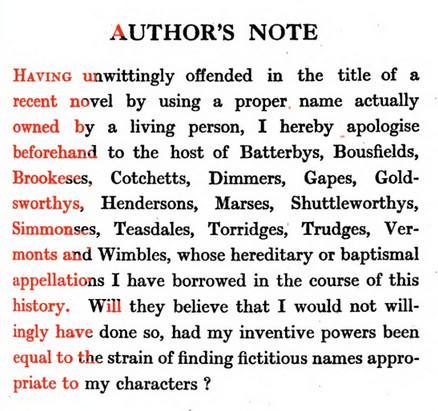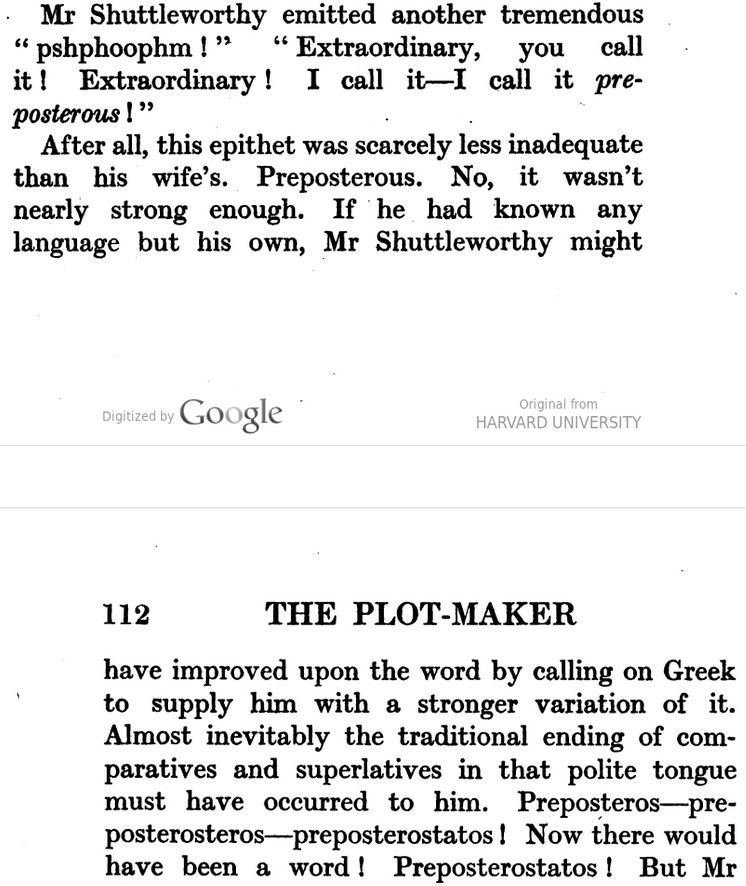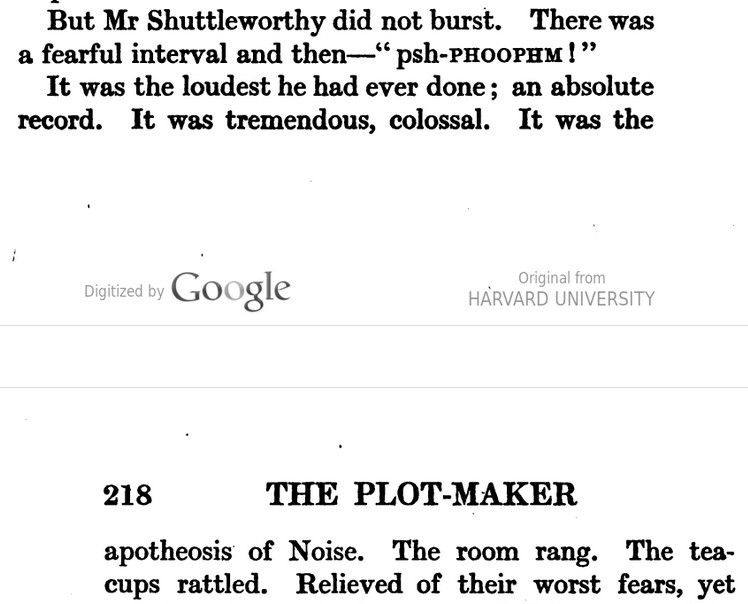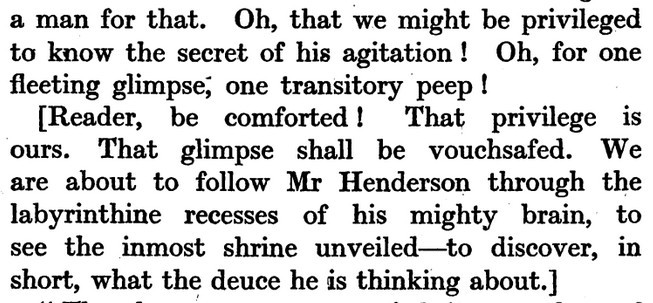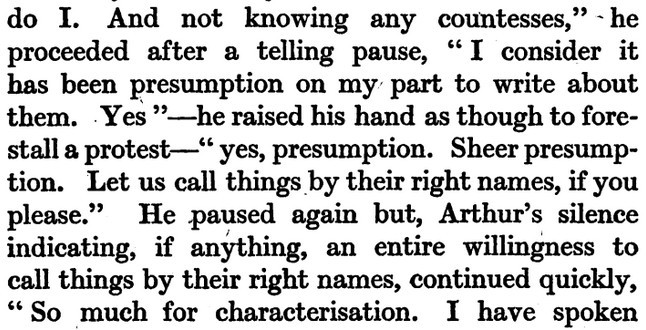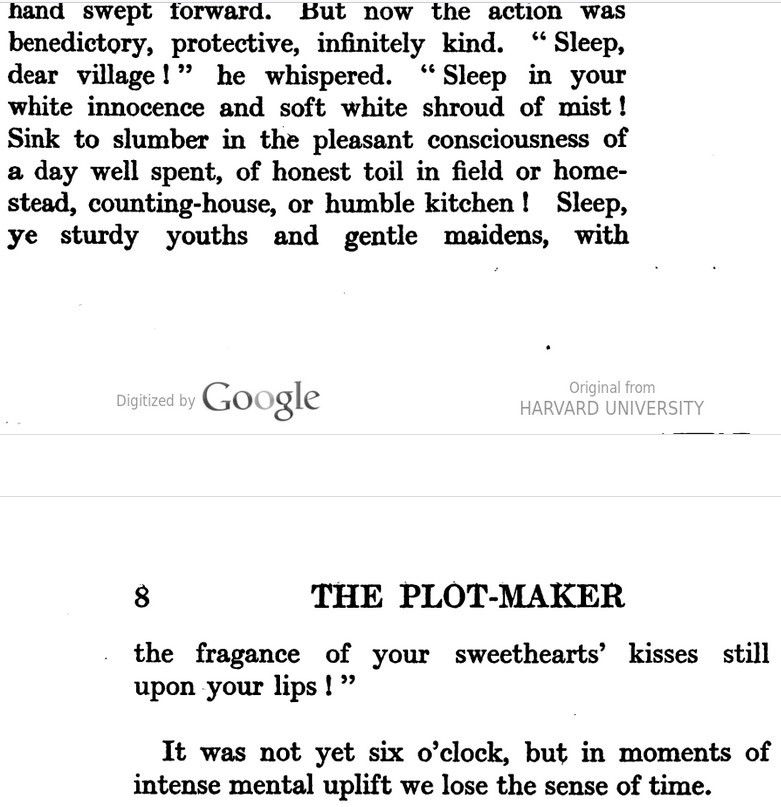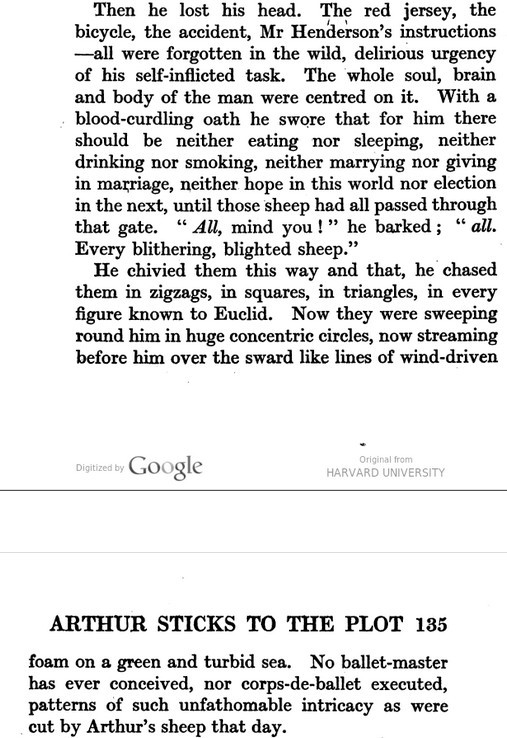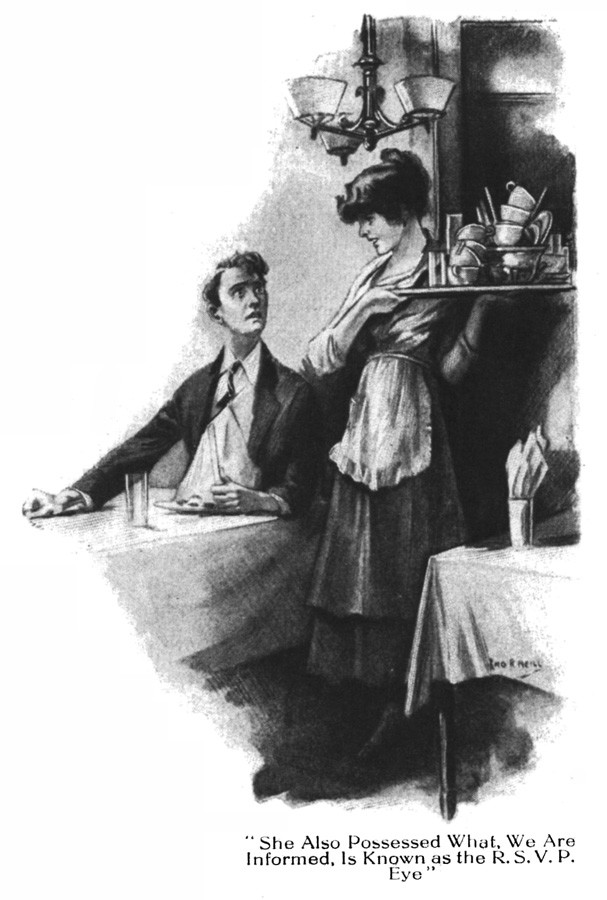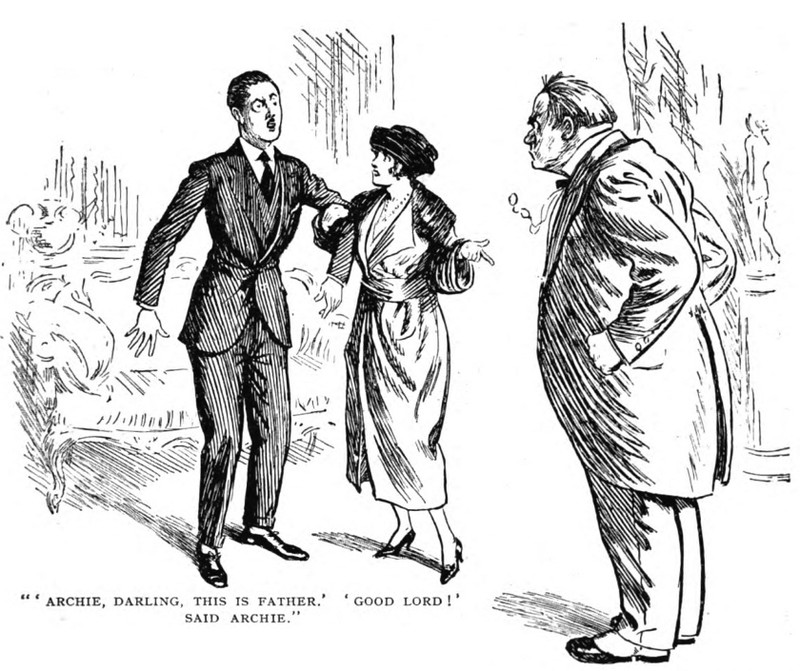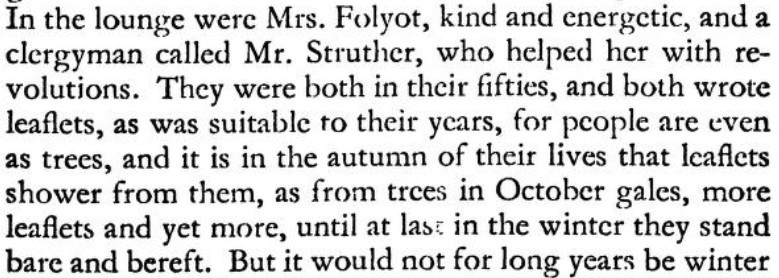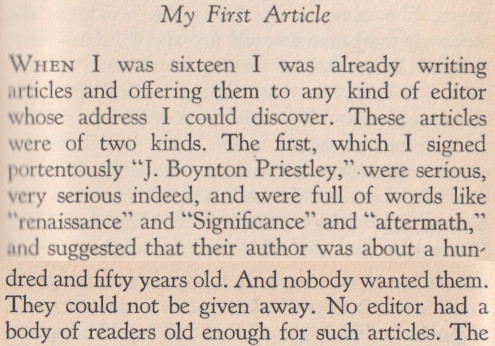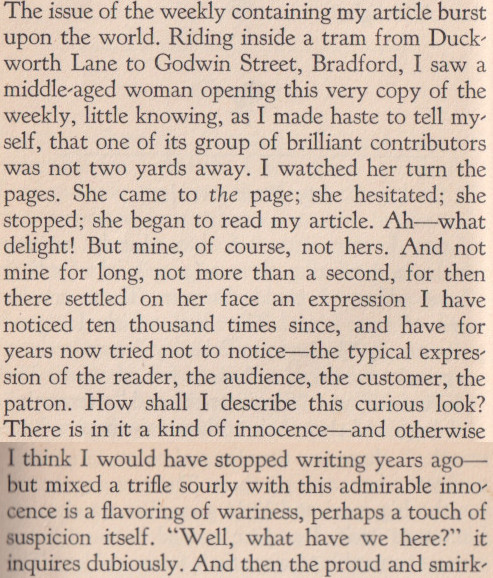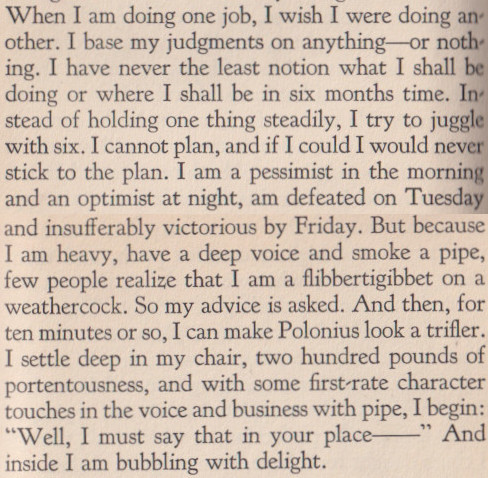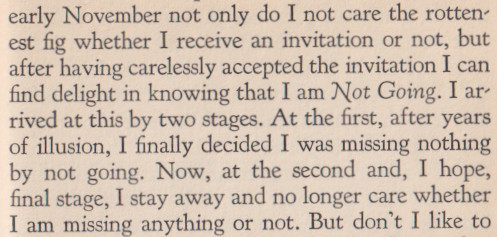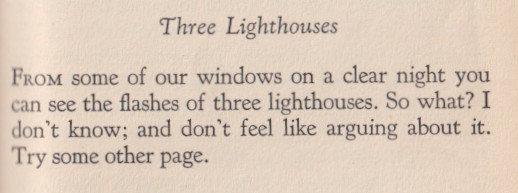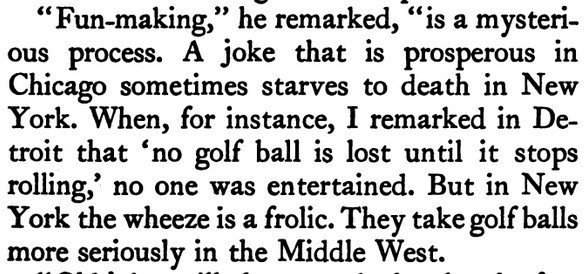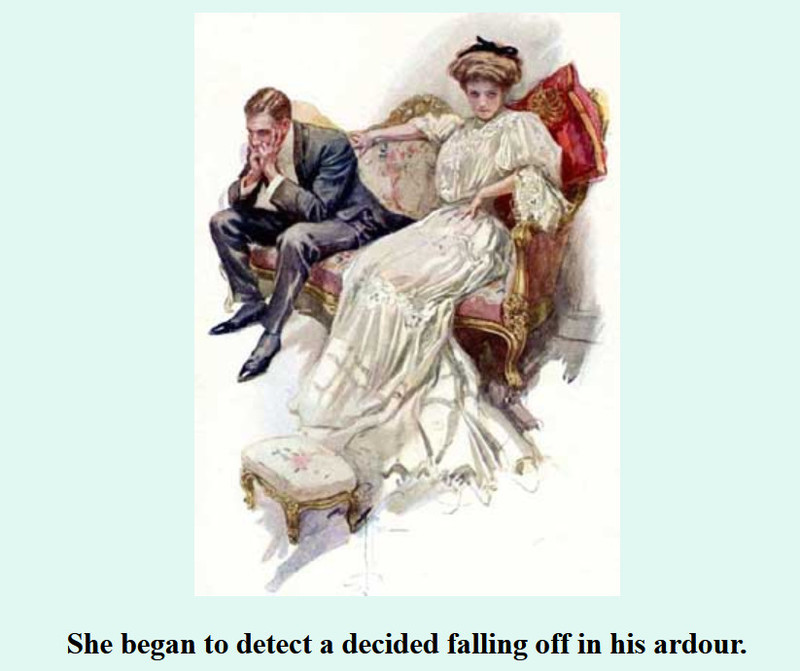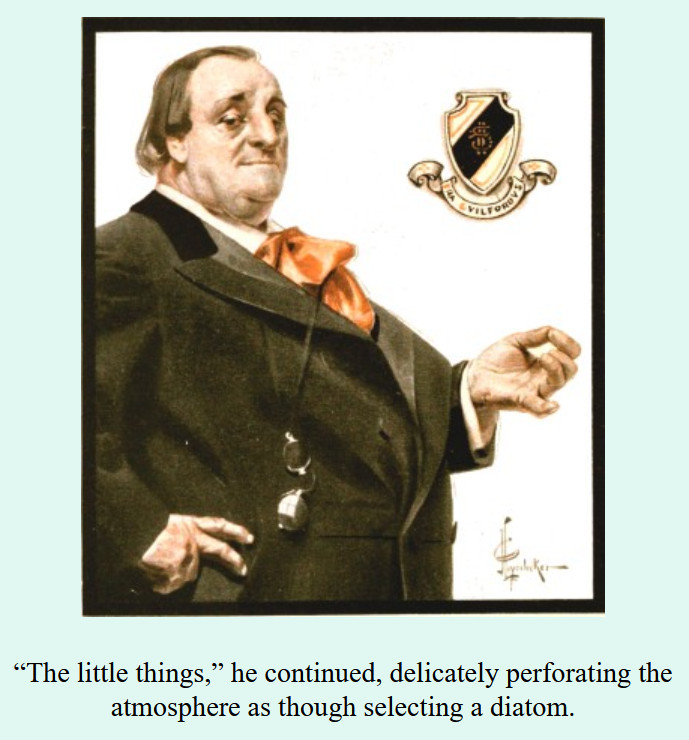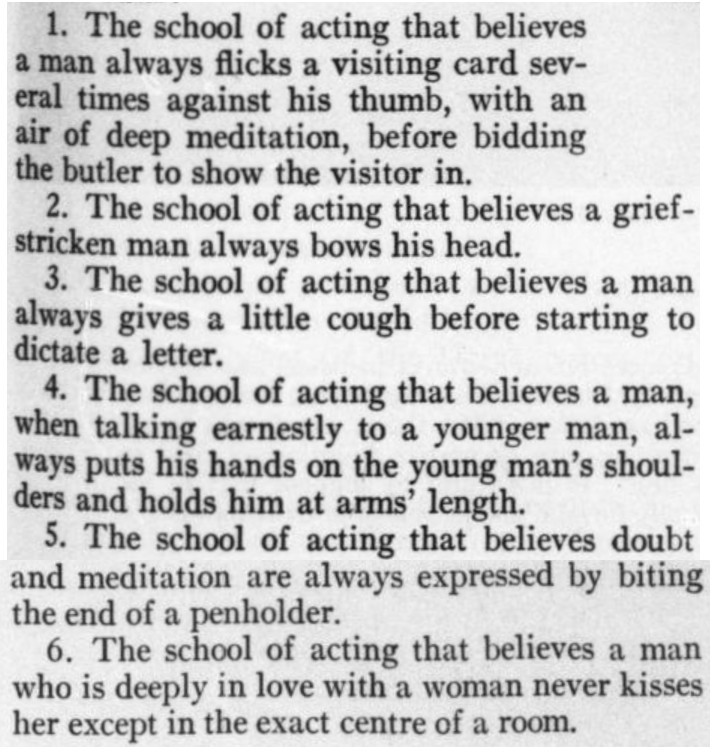|
|
 |
 |
 |
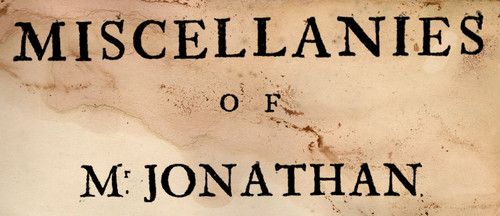
unearths some literary gems.
From Vanity Fair, Sept. 1917:
Notes:
1. What first attracted me to the ad for the pearls was the effect of "To Say the Least!" acting as a caption for the illustration of the woman above it, as though it were a decontextualized critical moment from a short story. Then I read the ad copy, which I thought was amusingly perplexing in its own right. It had me trying to do the math, and saying to myself, "Okay...so where exactly does that leave us?"
2. The rest of the attached snippets are from the Nathan piece whose clever title is shown. I like how beans figure in two independent bits, both of which are funny on their own in different ways. The (partial) list, as you may have guessed, represents a ranking of the supposedly funniest things in vaudeville as of even date. Farther down the list (and not shown here) appears "Imprinting a kiss of goodbye on a dollar bill about to be loaned to someone." Nathan appends a comment that his source proved fallible only in saying "Swiss where it should have been Gorgonzola" [attention: "Which Is Funnier?" desk]. Finally, re. the omnipresent "boob," I note that this article precedes by four years Merriam-Webster's earliest known date for "booboisie," a term which as you probably know was associated with (originated by?) Nathan's editorial partner Mencken.
|





 |
|
|
 |
 |
 |

unearths some literary gems.
|

 |
|
|
 |
 |
 |

unearths some literary gems.
|

 |
|
|
 |
 |
 |

unearths some literary gems.
From Stage-Land, by Jerome K. Jerome:
[The theatrical tropes explored here were probably pretty obvious targets for ridicule even in 1906; but some of JKJ's observations amused me despite that.]***We should not care to be the client of a farcical comedy stage lawyer. Legal transactions are trying to the nerves under the most favorable circumstances; conducted by a farcical stage lawyer, the business would be too exciting for us.***The adventuress is like the proverbial cat as regards the number of lives she is possessed of. You never know when she is really dead. Most people like to die once and have done with it, but the adventuress, after once or twice trying it, seems to get quite to like it, and goes on giving way to it, and then it grows upon her until she can't help herself, and it becomes a sort of craving with her.This habit of hers is, however, a very trying one for her friends and husbands—it makes things so uncertain. Something ought to be done to break her of it. Her husbands, on hearing that she is dead, go into raptures and rush off and marry other people, and then just as they are starting off on their new honeymoon up she crops again, as fresh as paint. It is really most annoying.***Everybody is more or less rude and insulting to every body else on the stage; they call it repartee there! We tried the effect of a little stage "repartee" once upon some people in real life, and we wished we hadn't afterward.***It is very curious, by the bye, how deserted all public places become whenever a stage character is about. It would seem as though ordinary citizens sought to avoid them[....]As for Trafalgar Square, the hero always chooses that spot when he wants to get away from the busy crowd and commune in solitude with his own bitter thoughts; and the good old lawyer leaves his office and goes there to discuss any very delicate business over which he particularly does not wish to be disturbed.And they all make speeches there....But it is all right, because there is nobody near to hear them. As far as the eye can reach, not a living thing is to be seen. Northumberland Avenue, the Strand, and St. Martin's Lane are simply a wilderness. The only sign of life about is a 'bus at the top of Whitehall, and it appears to be blocked.How it has managed to get blocked we cannot say. It has the whole road to itself, and is, in fact, itself the only traffic for miles round. Yet there it sticks for hours. The police make no attempt to move it on and the passengers seem quite contented.***The people on the stage think very highly of the good old man, but they don't encourage him much after the first act. He generally dies in the first act.[...]He is a most unfortunate old gentleman. Anything he is mixed up in seems bound to go wrong. If he is manager or director of a bank, smash it goes before even one act is over. His particular firm is always on the verge of bankruptcy. We have only to be told that he has put all his savings into a company—no matter how sound and promising an affair it may always have been and may still seem—to know that that company is a "goner."No power on earth can save it after once the good old man has become a shareholder.If we lived in stage-land and were asked to join any financial scheme, our first question would be:"Is the good old man in it?" If so, that would decide us.***There is something very wonderful about the disguising power of cloaks and hats upon the stage. This comes from the habit people on the stage have of recognizing their friends, not by their faces and voices, but by their cloaks and hats.A married man on the stage knows his wife, because he knows she wears a blue ulster and a red bonnet. The moment she leaves off that blue ulster and red bonnet he is lost and does not know where she is.She puts on a yellow cloak and a green hat, and coming in at another door says she is a lady from the country, and does he want a housekeeper?[...]There is something about her that strangely reminds him of his darling Nell—maybe her boots and dress, which she has not had time to change.***The thing that the stage sailor most craves in this life is that somebody should shiver his timbers."Shiver my timbers!" is the request he makes to every one he meets. But nobody ever does it.***
|



 |
|
|
 |
 |
 |

unearths some literary gems.
Wodehouse snippets:
***The Joyous Eyebrow [fictitious Broadway play]***Blue sea, gleaming Casino, cloudless sky, and all the rest of the hippodrome.***Lord Wildersham (pronounced Wing, to rime with Chiddingfold)***“Oh, don’t try and be funny, for goodness’ sake!” snapped Miss Verepoint. “It doesn’t suit you. You haven’t the right shape of head.”***“Moom?”“It’s spelt M-o-f-f-a-m, but pronounced Moom.”“To rhyme,” said Archie, helpfully, “with Bluffinghame.”***“I would do anything in my power to oblige the friend of a man whose cousin has met my brother at a garden-party, but there are no vacancies, I fear.”***In theatrical circles especially it holds a position which might turn the white lights of many a supper palace green with envy.***“I seen turnips with more spirit in ’em that what you’ve got. And Brussels sprouts. Yes, and parsnips.”***“Some day I knew I should meet the only girl I could possibly love, and then I would pour out upon her the stored-up devotion of a lifetime, lay an unblemished heart at her feet, fold her in my arms and say, ‘At last!’ ”“How jolly for her. Like having a circus all to one’s self.”***The collected jaws of the family fell as one jaw. Muriel herself seemed to be bearing the blow with fortitude, but the rest were stunned. Frank and Percy might have been posing for a picture of men who had lost their fountain pens.***[Cinquevalli again (and last time it wasn't Wodehouse)!]Although Dermot Windleband described himself as a Napoleon of Finance, a Cinquevalli of Finance would, perhaps, have been the more accurate description.***“No, no—I quite see that,” assented Roland. Dermot glanced up at him quickly, wondering whether, after all, he knew a little more than he had appeared to do. Luckily, Roland was trying, at the moment, to look intelligent, so Dermot was reassured.***“Why, if they know you want to buy you’ve as much chance of getting away from them without the paper as—as—well, I can’t think of anything that has such a poor chance of anything.”***[plus two illustrations/captions attached, from PGW stories in periodicals]
|

 |
|
|
 |
 |
 |

unearths some literary gems.
|

 |
|
|
 |
 |
 |

unearths some literary gems.
***
I was taken aback, and may be said to have stayed aback ever since.
***
Tomorrow, ten times the size of last Tuesday, is suddenly rich with promise.
***
[New York City is] a comic strip painted on vellum and bound in gold.
***
[The routine of preliminary play rehearsals] for the author is rather like conducting a party of tourists across fields of glue.
***
[The secret of the stereoscope] is that having attained at last the third dimension, it begins to remind us of the fourth dimension, that of Time.
***
[A dream is] a bonus after dark, another slice of life cut differently....Only a dream! Why only?
***
There is to me a curious pleasure...in coming upon a real street scene that looks like a good stage set. [I am totally with him on this!]
***
[The sound of an orchestra tuning up is] a chaos...but it is a chaos caught at the supreme moment, immediately before Creation. Everything of order and beauty shortly to be revealed is already there in it. Moreover, it never fails us, unlike some of the compositions that will follow it.
***
I must admit that with me the delight comes from receiving the free pass and not from actually making use of it....Ironically enough, once I have been given a free pass I rarely find any opportunity to use it.
***
[His younger self's journal notes] are portentous, each note weighing at least fifty-six pounds.
***
This kind of morning…. has a unique trick of lifting me out of time; I seem to be moving along a fifth dimension and to have a four-dimensional outlook. Or put it more sensibly like this. These mornings link up directly and vividly with similar mornings in my past, so that I am aware of myself as I was then.
***
[More snippets attached.]
[Bonus: A (presumably) nonexistent dull book called Life and Times of Lord Dreary. N.B. When transcribing that title just now, I initially left out "and Times." I'm glad I caught the error, because I genuinely feel the complete title is so much better than my inadvertently abridged version. The boring lord's life and times! (my emphasis).]
[Also: One of Priestley's little essays is a tribute to the everything-intentionally-goes-wrong act of Frank Van Hoven. I wasn't aware of this precursor to Tommy Cooper et al., but I assume you know all about him. The Internet tells me, correctly or otherwise, that FVH's slogan was "The Man Who Made Ice Famous." Priestley refers to a genre of FVH trick "as labyrinthine and regressive as a Kafka novel, a trick never to be completed in this world," and describes Van Hoven's unsuccessful struggle with all those uncooperative "things."]
|






 |
|
|
 |
 |
 |

unearths some literary gems.
From Iole, by Robert W. Chambers:
***“He calls it the house beautiful, you know.”“Why not the beautiful house?” asked Wayne, still more coldly.“Oh, he gets everything upside down.”***A thrill passed completely through Wayne, and probably came out on the other side.***“And, as it is the little things that are the most precious, so nothing, which is less than the very least, is precious beyond price.”***“Art is an art.” With which epigram he slowly closed his eyes....“Art,” continued the poet, opening his heavy lids with a large, sweet smile, “Art is above Art, but Art is never below Art. Art, to be Art, must be artless. That is a very precious thought—very, very precious. Thank you for understanding me—thank you.”***“You ask me what is Art. I will tell you; it is this!” And the poet, inverting his thumb, pressed it into the air. Then, carefully inspecting the dent he had made in the atmosphere, he erased it with a gesture and folded his arms.***A mechanical smile struggled to break out, but it was not the smile, any more than glucose is sugar.***A wan young man whose face figured only as a by-product of his hair whispered “Hush!”***“Verse is a necklace of tinted sounds strung idly, yet lovingly, upon stray tinseled threads of thought.”***“Let me cite, as an example, those beautiful verses of Henry Haynes,” he replied gravely.TO BE OR NOT TO BEI’d rather be a Could Be,If I can not be an Are;For a Could Be is a May Be,With a chance of touching par.I had rather be a Has BeenThan a Might Have Been, by far;For a Might Be is a Hasn’t BeenBut a Has was once an Are!Also an Are is Is and Am;A Was was all of these;So I’d rather be a Has BeenThan a Hasn’t, if you please.[I suspect Chambers made that poem--and its purported author--up; the only famous Henry Haynes I find is an entertainer who came later. Bernard Shaw in this book is represented by an offstage playwright* called Barnard Haw, so maybe "Henry Haynes" is a spoof on Heinrich Heine or someone? I also learned that this verse is widely misattributed to Milton Berle (who was born several years after this book was published). Though that may have happened in the usual way, I suppose in this case Berle himself might be to blame, as he was notorious for appropriating material.][*Well, of course the playwright usually remains offstage, but this one is doubly offstage.]***[Bonus: This is another book that includes Wodehousian bickering-telegram business. Iole was published in 1905, when I believe PGW was literarily still in short pants, that is to say mostly writing school stories--so I bet Chambers anticipated him.]
|


Page 18 of 64

> Older Entries...

Original Content Copyright © 2025 by Craig Conley. All rights reserved.
|




